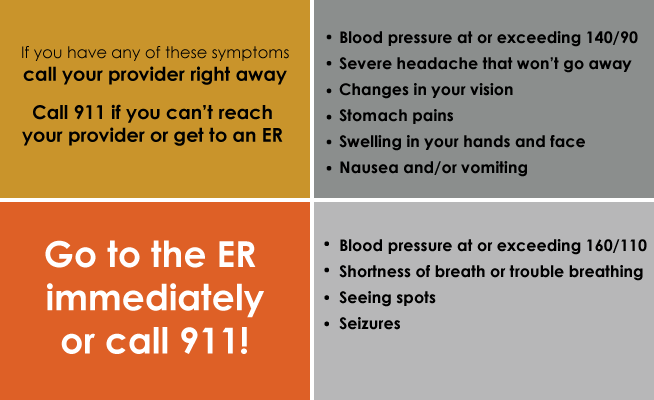What is Preeclampsia?
Preeclampsia, or high blood pressure during pregnancy, affects 5-8% of all pregnancies during and after pregnancy. This condition affects the mother and the unborn baby. Preeclampsia and other hypertensive disorders are the leading cause of maternal and infant illness or death. It is a rapidly progressive disorder that is characterized by high blood pressure and the unusual presence of protein in the urine. Other important symptoms to watch for include are swelling, sudden weight gain, headaches, and changes in vision. Most women with this rapidly advancing disease report few symptoms.
In most cases, preeclampsia symptoms will emerge around 20 weeks after the gestation (late second or third trimester or middle to late pregnancy) or up to six weeks postpartum (after delivery). In rare cases, it can occur earlier than 20 weeks. Your prenatal care is essential to diagnosing and managing your preeclampsia. Some outdated terms for preeclampsia are pregnancy-induced hypertension or toxemia. Other variations of preeclampsia include HELLP (hemolysis, elevated liver enzymes, low platelet count) syndrome and eclampsia (seizures).
The basic research of the causes of preeclampsia has been lacking for decades and is finally being revitalized, but the true cause of preeclampsia is unknown. Some theories that surround preeclampsia include the systemic inflammatory response, changes in the biology of the placenta, underlying maternal risks for cardiovascular disease, changes in immune factors and many more.
While there is much more to learn about preeclampsia, if you are pregnant it’s important to be aware of the risk factors and know what precautions you can take to avoid developing this condition:
Who is at risk:
- Those who have a previous experience with gestational hypertension or preeclampsia
- Those who have family with a history of preeclampsia
- Women who are carrying multiple babies
- First-time moms
- Women who are younger than 20 or older than 40
- Those who were diagnosed with high blood pressure or kidney disease prior to pregnancy
- Women who are obese or a BMI of 30 or greater
How to prevent preeclampsia:
- Drink lots of water, about 6-8 glasses daily
- Make sure you are getting enough rest
- Avoid eating a lot of processed or fried foods
- Keep a regular exercise regimen (inquire with your doctor a plan that is right for you)
- Make sure to elevate your feet numerous times a day
- DO NOT drink alcohol
- Avoid caffeine
- Use little to no salt in your diet

If you’re a member of The Health Plan who is concerned about preeclampsia and are pregnant or in the postpartum period, The Health Plan has nurses specialized in high-risk pregnancies who can help you. Call 1.800.624.6961 ext. 7644 to talk to a nurse and learn more about this program.